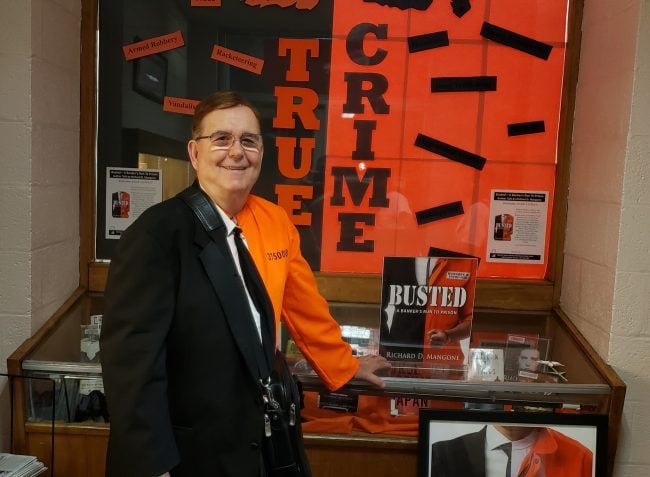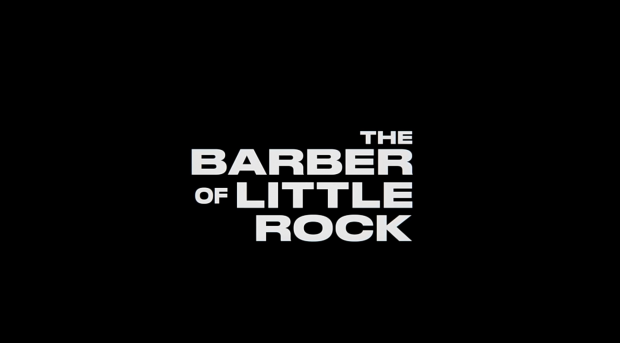 Richard Mangone promotes his book.
Richard Mangone promotes his book.
Richard Mangone admitted he was an insufferable, self-centered jerk consumed by greed when he became one of the nation's most successful credit union CEOs. Ironically, all that success, which garnered adulation, respect, power and trust from his peers, employees and board members, led to his downfall. On Sept. 12, 1995, Mangone was sentenced to 24 years in prison for orchestrating the largest credit union real estate fraud scheme, shocking the industry and costing it more than $45 million.
At that time, it was the longest prison sentence for a white collar crime ever handed down by a federal judge, who referred to Mangone's criminal acts as "egregiousness, evilness." However, for 18 months before he was sentenced he was on the lam because he feared dying in prison. While he was on the list of the FBI's most wanted fugitives, Mangone had a "come to Jesus" moment that he said transformed his life, leading him to surrender and spend the next 18 years incarcerated in a medium security prison in Ray Brook, N.Y., with other dangerous criminals and plenty of time to think.
Recommended For You
After his prison release in 2013, he settled in his hometown of Boston, where he started his life over in poverty and decided to write a book about his experiences, not for himself but in the hopes of warning and helping others, or as he puts it, "to save souls."
"All I cared about was the money. Every time I got into a transaction, it was about, how much money am I going to make? Those who were around me benefitted, too, but I was really thinking about myself. I was very selfish," the 75-year-old Mangone said in an extensive interview with CU Times. "I'm glad I survived and got through to the other side, but I tell you, I wouldn't recommend it. That's why I'm sharing my story, so other people, hopefully, won't have to go through what I went through. I wouldn't wish that on my worst enemy."
 Mangone's book cover.
Mangone's book cover. His 240-page book, "Busted: A Banker's Run to Prison," has received, so far, 31 five-star reviews from readers who called it a fascinating redemption story, a must-read, and a spell-binding rags to riches to rags story that should be made into a movie. Another reviewer who worked in the credit union industry for years said it should be required reading for all financial industry new hires.
His run to prison had its beginnings in 1980 when he became the founder and first CEO of Digital Employees Credit Union in Marlborough, Mass., which served the employees of the Digital Equipment Corp.
In just six months, Mangone and his staff opened two branches and a back-office operation. After that, they opened new branches throughout the nation and Puerto Rico.
That light-speed growth thrilled the DCU board, the corporation's management and staff.
Despite all of that success, however, something changed in Mangone.
"It was at this point where I made my first major decision that led to my downfall. Once the credit union had some 20 branches with its own new corporate headquarters building, I lost interest in the daily routines," Mangone wrote in his book. "I shifted into real estate and the stock market, which kept me very busy throughout the day. I spent less and less time at the credit union helm because my staff was so efficient. I was obsolete in many areas. My primary role was relegated to investments, budgeting and interfacing with the board of directors."
By 1986, Mangone accumulated a personal stock and bond portfolio of more than $2 million, making his DCU salary of $130,000 seem like petty cash. He wasted most of the money he made on frivolous spending and gambling.
During the 1980s, Mangone became one of the founders of Barnstable Community Federal Credit Union, which was opened to serve employees of small companies based in Barnstable, the largest community both in population and land, on Massachusetts' Cape Cod. While working as DCU's CEO, he served BCFCU as a consultant.
The BCFCU's board seats, all held by business owners, fed Mangone deals. The first one took only 20 minutes and made $100,000 split four ways on a bridge loan to quickly close on a commercial property in order to secure long-term financing.
The deal netted Mangone $25,000, and he remembered thinking, "Now that was too easy."
"At that time, I was so blinded by greed that I was not thinking about the conflict of interest issue that faced me," he wrote. "The value of money became meaningless. I had more than I needed and more than I could spend. I accumulated it for no reason other than to have fun. It was like running around the Monopoly board owning everything and travelling by yourself, just enjoying the rolls and scenery as you pass Go and collect your $200. In my case I was averaging well over $25,000 a week in the stock market gains with no cares in the world except my next investment."
Then BCFCU's attorney, Robert Cohen, who also served as the attorney for DCU, came up with the idea of setting up a real estate trust that would enable Mangone, Cohen, real estate developers Ambrose Devaney and James Smith, and others to legally conceal their direct ownership of or participation in their speculative real estate properties, such as motels and undeveloped land for residential subdivisions, according to court documents.
Although he felt comfortable that the loans made through the real estate trusts were legal, he also knew his personal involvement and ownership raised ethical questions. But that didn't stop him or his partners.
Between December 1985 and March 1991, Mangone, Cohen, Smith and Devaney borrowed funds from BCFCU to make the commercial real estate purchases. The trustees never disclosed that Mangone and his partners were the beneficiaries of the real estate trust because no one asked or inquired about it.
Mangone and Smith used their control over the two credit unions to obtain tens of millions of dollars in loans for their own real estate deals. The loans, in many instances, were funded in amounts far in excess of the purchase price of the property, with much of the excess going directly into the pockets of Mangone, Smith and Devaney, according to court documents.
Because Mangone had the total confidence of DCU board members, he convinced them to allocate $20 million for investment in participation loans with BCFCU without disclosing that Mangone was one of the borrowers of those funds. The DCU participation loans were placed into trusts owned by the former CEO, Smith, and in most cases, Devaney. And in each instance, the participation loans were funded in amounts far in excess of the actual purchase price of the commercial property.
According to court documents, these excess funds, known as "pie," were siphoned off and diverted to accounts controlled by Mangone and Smith for further distribution to others involved in the scheme. Although the amount of "pie" varied, it was generally between $75,000 and $200,000 per partner per loan.
"Our group got greedier and greedier as we clamored for a limited amount of available funds," Mangone wrote. "Other board members witnessed what we were receiving and each of them added their own personal transactions. Our weekly board meetings became 'What's in it for me?' It got so bad that some did not show up to the meeting unless they had loans in the pipeline."
Within five years, BCFCU had more than $70 million in assets, with about 95% of that loaned through real estate and personal loans. More than 75% of the loans in the portfolio were insider deals that could be traced to Mangone, his partners, board members, family, associates and friends.
According to Mangone's book, what finally exposed the scheme was the Tax Reform Act of 1986, which imposed a $25,000 limitation on interest deduction for real estate property. Because most of the loans went to investors who were purchasing newly-built homes for rental properties, the Tax Act dried up new home sales. What's more, some of the trustee borrowers, partners and others became insolvent.
"This put a phenomenal burden on us, and led to the Ponzi scheme that brought the entire conspiracy down. We had to cover monthly interest payments of $200,000," Mangone wrote. "Because of slow sales we were forced to refinance many of our properties, creating greater debt: A snowball turned into an avalanche."
Mangone knew a 15% delinquent loan ratio would draw closer scrutiny from NCUA examiners who were tipped off by a member about the credit union's problems. That member was a real estate attorney 90 days in arrears in his own home mortgage, which he failed to mention to the NCUA.
In January 1991, NCUA auditors arrived at DCU to launch an investigation.
Soon after that, Mangone was fired, the NCUA took over the credit union, all of the employees were let go and one of the co-conspirators became the U.S. Attorney's star witness for the government's prosecution of the case.
Surprisingly, the book revealed that when the former CEO and other businessmen began their real estate dealings through BCFCU, they certainly made unethical but nevertheless legal decisions and fully intended to make good on the investments. However, none of them anticipated the ordeal would create a Ponzi scheme that facilitated the massive multi-million loss.
"I'm convinced without a shadow of a doubt nobody went in with the intention of stealing money from Barnstable or Digital," Mangone reflected. "They had integrity, but it was self-imposed integrity and they thought they could end up getting out of this, and of course, obviously, they didn't. That's a terrible thing. That's how you get blinded by the greed, and the love of money and survival."
Survival was the only thing on Mangone's mind after learning he was going to be sentenced to 24 years for his fraudulent scheme. He got the max because he refused to plead guilty and instructed his lawyer to drag out the legal process with a trial by jury that found him guilty after many months of court proceedings, which cost more than $1 million, he estimated.
Mangone said he did this so he could have time to establish an at-home business that his wife could run to support herself. Before his sentencing hearing, he packed his belongings and more than $130,000 in cash, and became one of the FBI's most wanted fugitives.
 Mangone's wanted poster.
Mangone's wanted poster. While on the run, he established a new identity, made friends easily, owned a boat and even had a girlfriend. But when cash began to run low, he contemplated killing himself until he saw a TV evangelist preaching about the sacrifice of Jesus Christ who died to wash away humanity's sins. Mangone said he prayed with the preacher, cried, asked for Jesus to forgive his sins and surrendered to police.
"I know, I know. It is a cliché, but I felt a great weight lift from my shoulders. I felt different but did not know why," Mangone wrote.
Although his life in prison was threatened twice, he managed to circumvent violent skirmishes, bonded with other born-again Christian inmates, held several jobs including one to prevent inmate suicides, and befriended Ohio Congressman James Traficant and Ja Rule, a celebrity rapper, songwriter, actor and TV personality.
Incredibly, he had a one-in-a-million chance conversation with an inmate who proudly bragged that he got away with robbing $75,000 from a credit union in 1989 that turned out to be BCFCU's branch. That conversation took place 10 years after the robbery, which was three years past the statute of limitations to bring charges.
"I was free inside, which made my stay in prison a life experience that I enjoyed for the most part. Yes, some days got bad, especially when the men fought and hurt one another," he wrote. "But during the calm times it was a most notable experience that I will always treasure. It sounds really strange, but it is true."
Mangone, who is retired and living on Social Security, gives speeches about his ordeal to various groups, and all of his book's profits are donated to prison ministries and pastors who minister to inmates. While he was making about $200 a month from his prison job, about half of what he made went to pay the $41 million in restitution; now, about 10% of his Social Security goes to pay restitution.
Although Mangone is enjoying his life now, he said he has great remorse for what he did during his credit union career.
"Thousands of people were affected by my evil. That will be with me for the rest of my days. [There were] losses and people I hurt because of decisions I made," he said. "I lost friends, I lost family members. A lot of people were counting on me to do the right thing, and when you do the wrong thing, you end up paying that price. I'll carry that burden with me forever."
© Touchpoint Markets, All Rights Reserved. Request academic re-use from www.copyright.com. All other uses, submit a request to [email protected]. For more inforrmation visit Asset & Logo Licensing.







